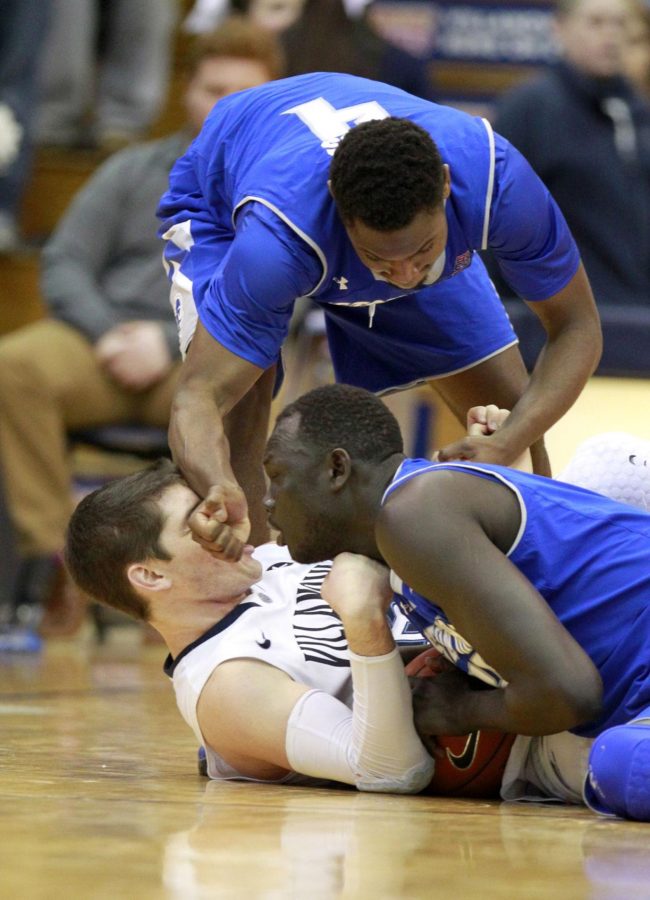Gibbs learned his lesson in face of two-game suspension
February 18, 2015
Everybody knows how it feels to be frustrated. We all handle that frustration in different ways, and it often doesn’t represent who we actually are. Some curse. Some give up.
Seton Hall junior guard Sterling Gibbs, younger brother of former Pitt guard Ashton Gibbs, handled it with violence.
With less than five minutes left in Monday night’s game and Seton Hall trailing Villanova by 26 points, a scrap for a loose ball broke out on the floor. It ended with Gibbs executing a near-perfect Randy Savage elbow drop across the face of Nova’s junior point guard Ryan Arcidiacono. The results: a Flagrant 2, meaning an ejection, and a social media explosion that could make someone who hadn’t been watching the game think a player had been beheaded on the court.
“People tweeting at me that Sterling Gibbs should not play a game again this season. No protest from my end.” – @MattNorlander (Matt Norlander, writer for CBS Sports)
“Sterling Gibbs should not be allowed to play the rest of the season for that strike to the face. It was intentional & Violent.” – @RealJayWilliams (Jay Williams, ESPN college basketball analyst)
“Arrived after 12-hour travel day to get to North Carolina and saw @RealJayWilliams on Sterling Gibbs. Totally agree.” – @ESPNAndyKatz (Andy Katz, senior ESPN writer)
Suspending him for the rest of the year? Banning him from the NCAA? Ruining the reputation and future of a kid because he made a mistake in the heat of the moment?
Forget about all the Twitter nobodies with their hot take opinions, or even the above media personalities. These are writers and analysts whom we as fans count on for reliable insight, and even they couldn’t see this issue clearly. I’m not defending Gibbs’ actions, which were egregious and fully out-of-bounds. But, just because Jay Williams said I should, I’m not willing to grab a pitchfork and join in the witch hunt of a college kid who let his frustration and emotions get the better of him.
Interestingly, sports media treated this incident much differently than the University of Louisville’s situation in December, when referees ejected All-American forward Montrezl Harrell for throwing a full-on haymaker at a Western Kentucky player. NCAA rules dictate that any ejection results in an automatic, non-appealable one-game suspension. But Harrell’s punch missed its intended target – a face – and got all air instead, so he wasn’t banned further.
There’s both a lesson to be learned and a bright side to look at here.
The lesson: when you’re mad and you want to make-believe that you’re wrestler John Cena, stop yourself, say, “I can’t be John Cena,” and be boxer Floyd Mayweather instead. Except only Floyd Mayweather is Floyd Mayweather, and you can’t do what he does, so when you try, you’ll punch air and only be suspended for one game instead of two. Because everybody knows that intending to crack open somebody’s skull and missing is fine, but actually connecting is bad.
The bright side: other kids who were called “punks” and “thugs” by objective, non-judgmental members of the media have succeeded in life. Pittsburgh Steelers safety Troy Polamalu nearly killed a Kansas State player on a punt play when he was in college (Google search “Troy Polamalu is a thug, and a sh*t human being”). Now he makes funny shampoo commercials and gives his luscious hair to less fortunate teammates. Barely anybody remembers that he almost ripped a guy’s torso off of his legs once.
In the more recent incident, Gibbs profoundly apologized after the game, and Arcidiacono forgave him in a Twitter exchange. On Tuesday, Seton Hall announced that it had suspended Gibbs for two games: a punishment worthy of the crime.
At the end of the day, Sterling Gibbs is a kid who made a mistake. Let’s leave it at that.



